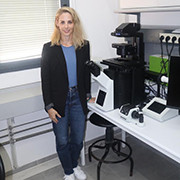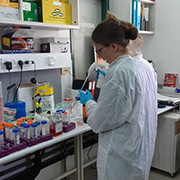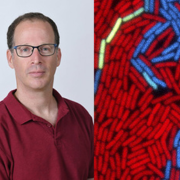A Father’s Scientific Journey
Tel Aviv Researcher Finds Potential Therapy for His Son’s Rare Disease - And Beyond
Scientific research careers tend to be personal - more a vocation than a job. Prof. Miguel Weil’s career is more personal than most. During his PhD, his first‑born son was diagnosed with Familial Dysautonomia (FD), a very rare genetic disease that damages the peripheral nervous system and affects about 300 people worldwide, a third of them in Israel. Ever since, Weil’s work has revolved around developing tools and knowledge to treat his son’s disease. To overcome the chronic lack of funding and interest typical of rare‑disease research, he focuses on biological processes relevant to common disorders and then applies the insights to FD.
Recently, after a 30‑year research journey, Prof. Weil of Tel Aviv University’s Shmunis School of Biomedicine and Cancer Research identified an enzyme target molecule that could benefit FD patients. He hopes to move the discovery toward the clinic because the same molecular target may also help in far more prevalent neurological conditions, including ALS, epilepsy and autism. “If I can’t develop a drug for FD because it’s such a rare disease, maybe we can develop it for other more common disorder and, along the way, add FD to the indications,” he explains.
Understanding FD
FD is a genetic condition most common among Ashkenazi Jews; about one in six carries a single copy of the mutation. Today it is included in standard pre‑pregnancy genetic screening in Israel, but those tests were not available when Nir, Prof. Weil’s son, was born in Jerusalem in 1990. When a baby with FD inherits a defective copy of the gene from both parents, production of a key protein is disrupted - especially in peripheral neurons. This impairs the development of the peripheral nervous system, slows motor development and causes multisystem symptoms. The disease is also progressive, gradually damaging existing neurons, although cognition and the central nervous system remain intact.
A better understanding of FD has led to many symptomatic treatments that have dramatically prolonged patients’ lives. “When Nir was born, his life expectancy was five years. He’s 35 now,” says Prof. Weil. “Yet none of the current treatments tackles the root cause.” To push the field forward, Weil spent years building experimental systems to study PNS development in chick embryos. “This let us pinpoint the role of the missing protein and how its deficiency drives FD,” he recalls. But human‑specific tools were still needed.
From Lab to Potential Therapies
The next step was a personalized patient cell system. “We began collecting cells from patients with different rare diseases and from healthy volunteers, then use a special imaging system that we could study the cells at high resolution. With this platform we can image thousands of cells from a single donor, characterize multiple genetic diseases, and identify disease‑related biomarkers.”
Weil’s lab then added robotics to create a high‑throughput pipeline for screening compounds. Its first success came in another rare disorder, adult polyglucosan body disease (APBD). After testing more than 11,000 compounds on APBD patient‑derived cells, they found several that markedly improved cell phenotypes. The lead molecule has been licensed to Golden Heart Flower Pharma and is in advanced development. “Three patients are already receiving the drug, and seems it halted their disease progression. They even went from wheelchairs back to do some walking”, he reports.
Applying a similar pipeline to FD cells, the team screened more than 50,000 compounds and found a compound hit for an enzyme that compensates for the missing protein. “We showed that this molecule ameliorates disease mechanism in FD cells, and it also works in neuronal models for other, much more common neurological disorders such as ALS and Huntington’s disease,” says Prof. Weil. His next goal is to expand studies testing this novel compound and therapeutic target across those broader types of diseases, hoping that one day the work will yield effective medicines for many including his son and the hundreds of other FD patients worldwide.





